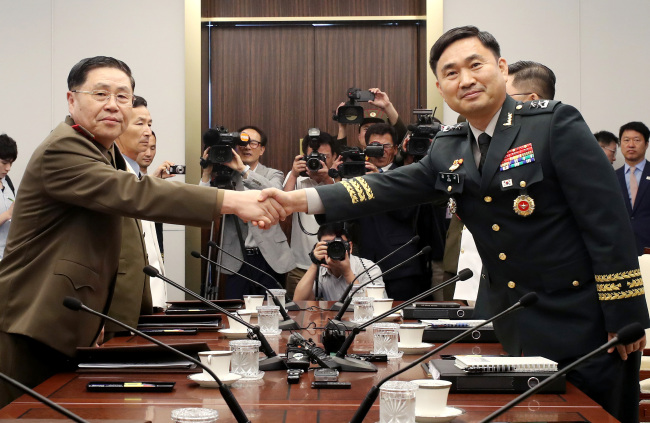The two Koreas’ militaries “broadly agreed” on the need for disarming a jointly controlled area at the truce village of Panmunjom and excavating war remains inside the heavily fortified Demilitarized Zone, Seoul’s Ministry of National Defense said Tuesday.
At general-level military talks held at Panmunjom Tuesday, the two sides’ delegates shared the need for the withdrawal of guard posts from the DMZ on a trial basis and suspension of hostile activities in the West Sea, the ministry said.
The two sides failed to come up with a joint statement and a specific timeline for the military confidence-building measures, however, after marathon negotiations that began at 10 a.m.
“Regarding specific implementation timeline and method, we agreed to continue our discussion through exchange of letters and working-level contacts,” South Korean chief delegate Maj. Gen. Kim Do-gyun said during a press briefing held after the talks.
“We believe that the inter-Korean military talks were meaningful because we aligned our positions and shared the need for implementing military components of the Panmunjom Declaration following the inter-Korean summit in April,” Kim said.
 |
South Korean chief delegate Maj. Gen Kim Do-gyun shakes hands with his North Korean counterpart An Ik-san during a general-level military talks held at Panmunjeom Tuesday. Yonhap |
Before attending the military talks, Kim told reporters the meeting aimed to implement the Panmunjom Declaration, in which President Moon Jae-in and North Korea’s leader Kim Jong-un agreed to cease cross-border hostilities and build trust for a possible arms reduction.
Expectations have been heightened that the two Koreas will discuss the withdrawal of troops and equipment from guard posts inside the Demilitarized Zone as part of efforts to transform the heavily fortified area into a symbol of peace between the two Koreas.
In a briefing to lawmakers last week, the Ministry of National Defense said the withdrawal plan would be sought “on a trial basis” until the conditions are in place for a complete withdrawal, following environmental and historical research on the cross-border region.
“The two Koreas agreed on the need to withdraw guard posts on a trial basis, expanding the cooperation into a broader area and ultimately pulling out all guard posts,” a military official told reporters under the customary condition of anonymity.
The official added that South Korea will not withdraw the guard posts unilaterally, stressing the measure would also apply to North Korea. “It was more about building a consensus for a starting point,” the official said.
The meeting kicked off at 10 a.m. after North Korean delegates crossed the border with South Korea at the truce village of Panmunjom. The meeting took place at the Peace House on the South Korean side.
The two Koreas each brought a five-member delegation to the meeting. The South Korean delegation consisted of officials from the Joint Chiefs of Staff, Unification Ministry and Cheong Wa Dae. The North Korean delegation included officers from its army and navy.
The meeting came after North Korea’s relentless calls for South Korea to exert an active role in declaring an end to the Korean War, which ended with an armistice, not a peace treaty. Pyongyang has accused the US of delaying the declaration and making unilateral demands for denuclearization.
“Some (South Korean media reports) suggested that we are trying to talk South Korea into pursuing the declaration of ending the Korean War because our attempts to convince the US are not working out,” North Korea’s chief delegate An Ik-san said after greeting the South Korean delegates.
“I think it does make sense,” An added. “Whether (those reports) are valid or not, we have come to realize that all the Korean people take really seriously today’s meeting ... and our militaries’ efforts for peace and prosperity between the two Koreas.”
The Moon Jae-in administration seeks to declare an end to the Korean War as soon as possible and within this year. The administration asserted that the measure would facilitate North Korea’s denuclearization process by offering it a security guarantee.
The general-level meeting came about a month after the two Koreas held military talks for the first time in 11 years. The previous meeting ended without a significant breakthrough in military confidence-building measures.
The two sides’ delegates engaged in marathon negotiations, even forgoing a lunch break, after having started the meeting on a positive note. The delegates exchanged pleasantries and jokes before entering closed-door negotiations.
“There is a saying that goes like this: Grains will not grow well when they are not taken care of. I think it takes time and effort to reap good grains,” said South Korean chief delegate Maj. Gen. Kim Do-gyun when he greeted his North Korean counterpart An.
“Through the April 27 Panmunjom Declaration, I think seeds have already been planted. By putting our heads together for earnest deliberations despite the sweltering heat, I think we can definitely secure a good harvest this fall,” Kim added.
North Korean chief delegate An sought to break the ice with a joke about a bundle of documents carried by Kim. “Look at those papers, it seems they have a lot to bring up,” An said, prompting laughter among participants.
By Yeo Jun-suk(
jasonyeo@herald.com)






![[Herald Interview] 'Trump will use tariffs as first line of defense for American manufacturing'](http://res.heraldm.com/phpwas/restmb_idxmake.php?idx=644&simg=/content/image/2024/11/26/20241126050017_0.jpg)
![[Health and care] Getting cancer young: Why cancer isn’t just an older person’s battle](http://res.heraldm.com/phpwas/restmb_idxmake.php?idx=644&simg=/content/image/2024/11/26/20241126050043_0.jpg)
